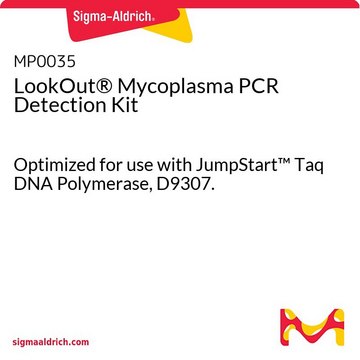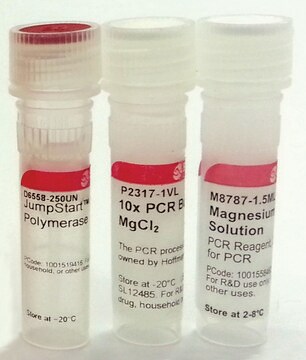MP0025
Venor™ GeM Mycoplasma Detection Kit, PCR-based
Sinónimos:
PCR mycoplasma detection kit
About This Item
Productos recomendados
usage
kit sufficient for 25 tests
Quality Level
packaging
pkg of 1 kit
storage condition
dry at room temperature
technique(s)
PCR: suitable
application(s)
detection
microbiology
storage temp.
2-8°C
General description
Application
Components
Storage and Stability
Legal Information
Solo componentes del kit
- Positive Control
- Negative Control
- PCR 10X Reaction Buffer 500 mL/vial
- Primer/Nucleotide Mix 1 mL/vial
Storage Class
10 - Combustible liquids
wgk_germany
WGK 3
Certificados de análisis (COA)
Busque Certificados de análisis (COA) introduciendo el número de lote del producto. Los números de lote se encuentran en la etiqueta del producto después de las palabras «Lot» o «Batch»
¿Ya tiene este producto?
Encuentre la documentación para los productos que ha comprado recientemente en la Biblioteca de documentos.
Los clientes también vieron
Artículos
Know when to use antibiotics to prevent contamination in cell culture and find related products at Sigma-Aldrich.com
Detect mycoplasma contamination in cell cultures three ways: culture test, DNA stain test, or mycoplasma PCR test. Mycoplasma elimination kits rid cultures of contamination.
Protocolos
Mycoplasma contamination of cell cultures is a serious issue impacting cell model validity. PCR testing for mycoplasma is an inexpensive, sensitive, and specific method for detecting contamination.
Nuestro equipo de científicos tiene experiencia en todas las áreas de investigación: Ciencias de la vida, Ciencia de los materiales, Síntesis química, Cromatografía, Analítica y muchas otras.
Póngase en contacto con el Servicio técnico











